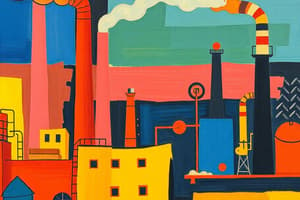Podcast
Questions and Answers
What preceded the Industrial Revolution?
What preceded the Industrial Revolution?
- The Agricultural Revolution (correct)
- The Scientific Revolution
- The Feudal Revolution
- The Colonial Revolution
What was the first country to experience the Industrial Revolution?
What was the first country to experience the Industrial Revolution?
- The United States
- Germany
- France
- Britain (correct)
What allowed for a larger industrial workforce?
What allowed for a larger industrial workforce?
- A higher population due to lower infant mortality (correct)
- The presence of all the required resources located close together
- Proportionally large amounts of spare capital for investment
- A general culture of hard work, taking risks, and developing ideas
What is the term used to describe the period before the 1830s?
What is the term used to describe the period before the 1830s?
What was one of the most affected industries during the Industrial Revolution?
What was one of the most affected industries during the Industrial Revolution?
Flashcards are hidden until you start studying
Study Notes
- The Industrial Revolution was a period of massive economic, technological, social, and cultural change which affected humans to such an extent that it's often compared to the change from hunter-gathering to farming.
- The term "industrial revolution" was used to describe the period before the 1830s, but modern historians increasingly call this period the "first industrial revolution."
- This period was characterized by developments in textiles, iron, and steam (led by Britain) to differentiate it from a second revolution of the 1850s onwards, characterized by steel, electrics, and automobiles (led by the U.S. and Germany).
- The end of feudalism changed economic relationships (with feudalism used as a useful catch-all term and not a claim that there was classic-style feudalism in Europe at this point). More causes of the Industrial Revolution include: a higher population because of less disease and lower infant mortality, which allowed for a larger industrial workforce.
- The agricultural revolution freed people from the soil, allowing (or driving) them into cities and manufacturing, creating a larger industrial workforce.
- Proportionally large amounts of spare capital for investment.
- Inventions and the scientific revolution, allowing for new technology.
- Colonial trade networks.
- The presence of all the required resources located close together, which is why Britain was the first country to experience the industrial revolution.
- A general culture of hard work, taking risks, and developing ideas.
In summary, the Industrial Revolution was a period of dramatic change in many different industries that led to increased production and efficiency. It was preceded by the agricultural revolution, which freed people from the soil and allowed them to move into cities and manufacturing. This in turn created a larger industrial workforce, which allowed for more investment and innovation. Additionally, the arrival of steam power and other technological advancements allowed for deeper mining and more efficient production. Socially and culturally, the Industrial Revolution led to new city and factory cultures, debates and laws regarding child labor, and anti-technology groups like the Luddites.
- The industrial revolution began in Britain in the 18th century
- This revolution was a time when many industries began to change, and cotton was one of the most affected
- There are many theories about why the industrial revolution began in Britain, but it is still a debated topic
- The industrial revolution led to many new inventions and improvements in technology, which helped the country become a major power in the world
Studying That Suits You
Use AI to generate personalized quizzes and flashcards to suit your learning preferences.



